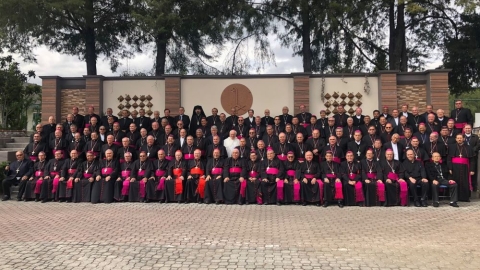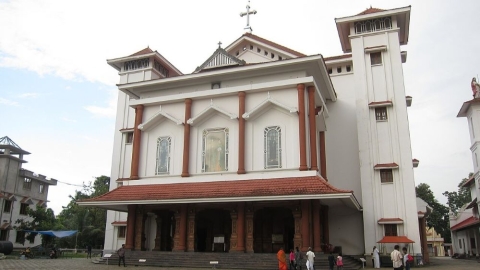Synod on Synodality: “A Church Alive and on the Move”

The General Secretariat of the Synod has issued a press release for the completion of the work of the group of theologians gathered in Rome from June 4 to 14 to begin the writing of the Instrumentum laboris (IL), which will be used during the second session this October.
The inventiveness of this press release must be acknowledged, with the title: “A Church alive and on the move,” which is a sort of pleonasm. The perennial philosophy—that of the scholastics and St. Thomas—defines life through movement: vita in motu—life resides in movement, or reveals itself in (spontaneous) movement. This shows the originality of such a title.
The press release specifies that, “The group of theologians (women and men, bishops, priests, consecrated men and women, and lay people) from different continents worked on the 107 reports from the Bishops' Conferences [...] the contribution of the USG-UISG (the International Union of Major Superiors and the International Union of Superiors General, respectively), and the more than 175 submissions,” coming from structured groups. Reports presented by the parish priests during their three-day work meeting in Rome were also included.
Cardinal Jean-Claude Hollerich, General Rapporteur of the XVI Ordinary General Assembly of the Synod of Bishops—the Synod on Synodality—was delighted to see that, “The Holy People of God has been set in motion for mission thanks to the synodal experience.” He concludes by affirming that, “The seeds of the Synodal Church are already sprouting!”
The language is revelatory. The seeds of a plant are specific: they grow a particular flower or tree. If there are “seeds of the Synodal Church,” is this the Catholic Church? Because the “seeds” of the Church are well-known: grace, the theological virtues, the sacraments, and the Catholic priesthood; it is the “mustard seed” that its founder sowed in the hearts of His children.
“Among the themes most frequently mentioned are: formation for synodality, the functioning of participatory bodies, the role of women, young people, attention to the poor, inculturation, transparency and a culture of accountability on the part of those who assume ministry in the Church, but also catechesis and Christian initiation, collaboration among churches, the figure of the bishop, etc.”
In view of the “confusion, worry or anxiety” expressed in certain reports, especially the “fear that what is sent is not taken seriously or that ideologies and lobbies of the faithful may exploit the synodal path to impose their own agenda,” Cardinal Mario Grech, Secretary General of the General Secretariat of the Synod, wanted to be reassuring.
He wanted to point out that “it is good to remember that the October Assembly is not about this or that issue, but about synodality, about how to be a missionary Church on the way. All the theological issues and pastoral proposals for changes have this purpose.”
As for the process of writing the IL, the press release tells us that it “will continue with other stages: [...] the Ordinary Council will carry out an initial discernment of what has been drafted,” then will come “the stages of drafting the actual document.”
The Special Secretary of this Assembly, Msgr. Riccardo Battocchio clarified that, “The Instrumentum Laboris for the Second Session of the XVI Assembly will look different from the previous one. [...] the working document for the October session intends instead to highlight some knots to be unraveled in order to answer the question, How to be a synodal Church in mission, taking in the path made so far and proposing theologically grounded arguments together with some concrete proposals to help the discernment entrusted to the members of the assembly.”
The observer has the distinct impression of witnessing a new birth of the Church. But the Church no longer has to be born, even if she can always be reformed, in the sense of a purification of outgrowths which would have come to somewhat obstruct her purity, at least in the heart of men: this is always what she has done. An attempt at newness, on the other hand, can only lead to disaster.
Especially since this newness extends to nothing but modifying the structure of the Church in what is divine and revealed, in particular the power of the Catholic hierarchy, the very nature of the priesthood, and the purity of the Faith. For the moment, we must wait for the new IL.
Related Article:
(Source : Secrétariat général du Synode – FSSPX.Actualités)
Illustration : synod.va





